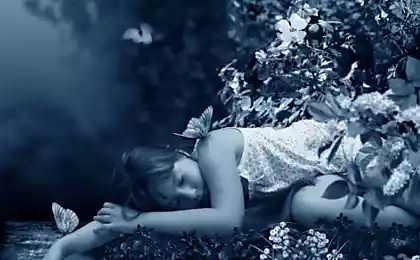852
Sleep

1. During sleep, we are paralyzed
Believe it or not, but our body is virtually paralyzed during sleep, mainly in order not to repeat the body movements that occur during sleep.
2. External stimuli affect our dreams
Each of us has ever experienced it myself: the subconscious part of sleep makes a physical sensation, which we are experiencing at the moment. People thirsty, subliminal "throws" the image of a glass of water. They are trying to get a drink (in a dream, of course), thirsty again, again sees a glass of water and so on - until you wake up and realize that really want to drink and get drunk in the real world. Thus, the subconscious, "suggests" you need to wake up.
3. Former smokers see more vivid dreams
Former smokers see more vivid and realistic dreams than all other people. Most often, they dream that they started smoking again, and feel a sense of guilt in this case.
4. Dreams are never literal
Our subconscious uses the language of signs and symbols. Therefore, you should not take every dream, even with the most logical and rich story, literally. The subconscious is sending us signals, and the images are not clear.
5. Not everyone can see colorful dreams
About 12% of sighted people see only in black and white dreams. The rest of dreaming in color. There are several groups of typical dreams, who see all, without exception: the situation in school or at work, trying to escape from prosecution, a fall from a height, a person's death, loss of teeth, flying, failure in examinations, accident, etc.
6. We dream only what we saw
In our dreams we often see strangers, but have no idea that our consciousness comes up with their faces. It faces of real people, those we have seen throughout life, but did not remember.
7. Dreams prevent psychosis
Recently, scientists conducted an experiment: subjects were deprived of sleep position 8 hours but waking in the initial phase of every dream. Three days later, all without exception participants in the experiment were observed concentration difficulties, hallucinations, unexplained irritability, and early signs of psychosis. When the subjects were finally given the opportunity to dream, scientists have noticed that the brain compensates for the lack of dreams in previous days due to a longer than usual, finding the body in REM sleep.
8. Dreams see everything without exception
All people (except in patients with a strong mental disorder) have dreams, but men and women dreaming differently. Men are mostly representatives of the dream their sex, women see the same dreams of both sexes in roughly equal proportions.
9. We forget 90% of dreams
Five minutes after waking up, we do not remember half of his dreams, and in ten minutes you will be able to recall almost 10% of them. There are cases where poets, writers, scientists have had dreams in which wrote poetry, prose, or invent a new scientific theory. Lucky those who guessed leave bedside pen and paper. It dreams are due to the birth of Samuel Coleridge poem "Kubla Khan," the story of Dr. Jekyll and Mr. Hyde by Robert Louis Stevenson, Mary Shelley's Frankenstein, as well as the famous periodic table, it is also the periodic table.
10. Blind "see" dreams
People who have been blind after birth can see dreams in the form of pictures. Blind from birth do not see the pictures, but their dreams filled with the sounds, smells and tactile sensations.
























